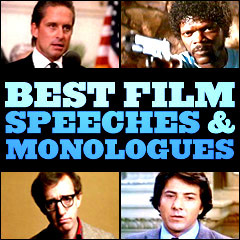|
Best Film Speeches and Monologues
|
|
Title Screen
|
Film Title/Year and Description of Film Speech/Monologue |
Screenshots
|

|
Home Alone (1990)
Screenwriter(s): John Hughes
 "I'm
In Good Shape" "I'm
In Good Shape"
Play clip (excerpt): 
8-year old Kevin McCallister (Macaulay Culkin)
- accidentally abandoned in his home when his parents flew
to France for Christmas, spoke to his mirror image about personal
grooming - without his parents to assist. He combed his hair,
applied Right Guard deodorant under his armpits, and put aftershave
lotion on his face - causing him to scream:
I took a shower washing every body part with
actual soap, including all my major crevices, including
in between my toes and in my belly button which I never
did before but sort of enjoyed. I washed my hair with adult
formula shampoo and used cream rinse for that just-washed
shine. I can't seem to find my toothbrush, so I'll pick
one up when I go out today. Other than that, I'm in good
shape.
|

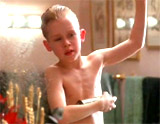
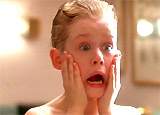
|

|
Jacob's Ladder (1990)
Screenwriter(s): Bruce Joel Rubin
 Guardian
Angel Advice about Dying Guardian
Angel Advice about Dying
Angelic and kindly chiropractor Louis' (Danny
Aiello) calming and soothing speech to troubled soul and Vietnam
vet Jacob Singer (Tim Robbins) to relieve him from devils and
his fear of dying during a treatment session when he repeatedly
cracked Singer's spine:
You ever read Meister Eckart?...How'd you
get your doctorate without reading Eckart? Relax...You're
a regular basket case, you know that? Eckart saw Hell,
too. You know what he said? He said: 'The only thing that
burns in Hell is the part of you that won't let go of your
life. Your memories, your attachments. They burn 'em all
away. But they're not punishing you,' he said. 'They're
freeing your soul.' Relax. Good. So the way he sees it,
if you're frightened of dyin' and you're holdin' on, you'll
see devils tearin' your life away. But if you've made your
peace, then the devils are really angels, freein' you from
the earth. It's just a matter of how you look at it, that's
all. So don't worry, okay? 'K? (laughing) Relax,
relax. Relax.
|

|
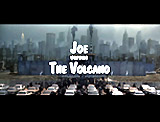
|
Joe Versus The Volcano
(1990)
Screenwriter(s): John Patrick Shanley
 "I
Can Feel Them Sucking the Juice Out of My Eyeballs" "I
Can Feel Them Sucking the Juice Out of My Eyeballs"
After a terminal illness diagnosis with only
six months to live, downtrodden medical supply firm office
worker Joe Banks (Tom Hanks) expressed his real detestable
feelings about his job to unpleasant boss Mr. Frank Waturi
(Dan Hedaya) after returning from a three hour lunch to his
desk area, covered in the greenish-light of flourescent lights.
He blamed his condition on a "brain cloud" before
announcing that he was quitting. He packed up his desk (with
a Classics Illustrated copy of Robinson Crusoe, and
the books Romeo and Juliet and The Odyssey; also
taking his ukulele and lamp), and bequeathed his lamp to co-worker
secretary DeDe (Meg Ryan).
Mr. Waturi, Frank. I quit....I've been working
here four and a half years. The work I did I probably could
have done in six months. That leaves four years left over.
Four years. If I had them now - like gold in my hand. (he
presented his lamp to DeDe) Here, this is for you.
Goodbye, DeDe.
He then turned around to confront Mr. Waturi:
This life. Life, what a joke! This situation,
this room...You look terrible, Mr. Waturi. You look like
a bag of s--t stuffed in a cheap suit. Not that anybody
could look good under these zombie lights. I, I, I can
feel them sucking the juice out of my eyeballs. Suck suck
suck suck suck. (sucking noise) $300 bucks a week.
That's the news. For $300 bucks a week, I've lived in this
sink, this used rubber (Frank: "Watch it, mister.
There's a woman here") Don't you think I know that,
Frank? Don't you think I'm aware that there is a woman
here? I can smell her, like, like a flower. I can taste
her like sugar on my tongue. When I'm 20 feet away, I can
hear the fabric of her dress when she moves in her chair!
Not that I've done anything about it.
I've gone all day, every day, not doing, not
saying, not taking the chance, for $300 dollars a week. And
Frank, the coffee, it stinks. It tastes like arsenic. These
lights give me a headache. If they don't give you a headache,
you must be dead, so let's arrange the funeral....You're
not tellin' me nothin'....Why, I ask myself, why have I put
up with you, I can't imagine. But I know. It's fear. Yellow
freakin' fear. I've been too chicken-s--t afraid to live
my life, so I sold it to you for $300 freakin' dollars a
week! (He grabbed Waturi by the collar) You are lucky
I don't kill you! You're lucky I don't rip your freakin'
throat out! But I'm not going to! And maybe you're not so
lucky at that. 'Cause I'm gonna leave you here, Mr. Wahoo
Waturi. And what could be worse than that? (Joe left,
but then the door re-opened and he came back in) DeDe?...
How about dinner tonight?
|

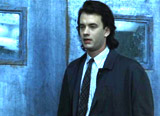
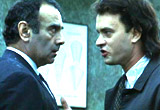
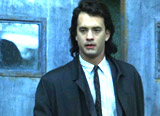
|

|
Joe Versus The Volcano
(1990)
Screenwriter(s): John Patrick Shanley
 During
a Moon Rise - "Thank You For My Life" During
a Moon Rise - "Thank You For My Life"
While floating on a raft, Joe experienced an
astonishing fever-dream when he hallucinated a gigantic full
moon rising on the horizon, bowing before it and praying, before
slowly and physically crumbling from thirst, fever and exhaustion:
Dear God, whose name I do not know - thank
you for my life. I forgot how big... Thank you. Thank you
for my life.
Patricia Graynamore (Meg Ryan) told Joe about
her love for him as he was about to heroically jump into the
Big Woo volcano as a human sacrifice for the Waponis (led by
the Waponi Chief (Abe Vigoda)), to appease their gods (once
every century):
Wait! Stop! Wait! Stop right there! I love
you! I've fallen in love with you! I've never loved anybody!
I don't know how it happened? I never even slept with him
or anything. And now you're gonna kill yourself! (Joe: "Can
you give us a minute?" (to Patricia) "You
love me?")
Yes, I love you! I can feel my heart! I feel
like I'm going crazy! You just can't die and leave me here
on this stinking earth without you!
He famously responded:
I've got to do it...'Cause I have wasted
my entire life and I'm gonna die. Now, I have a chance
to die like a man and I'm gonna take it! I've gotta take
it! (Patricia: "I love you") I love you, too!
I've never been in love with anybody before, either! It's
great! I am glad! But the timing stinks. I gotta go.
He kissed her and walked up the steps to the
edge of the volcano. Patricia bolted after him and proposed:
"Marry me...Marry me and then jump in the volcano." The
Chief was asked to perform the ceremony for them - although Joe
showed some hesitation. Patricia encouraged him:
What is the problem? You're afraid of the
commitment? You're gonna have to love and honor me for
about 30 seconds. You can't handle that?
After being married in a very short ceremony,
she again told him: "Don't jump in." He replied: "Patricia,
listen to me. These are my last words. I gotta be brave. I
gotta jump in. Good-bye." Patricia proposed that they
leap together: "We'll take this leap and we'll see. We'll
jump and we'll see. That's life." He agreed that they
should go together, hand in hand, and both hope for a miracle:
Joe: I've been miserable so long. Years of
my life, wasted I'm afraid. It's been a long time coming
here to meet you. A long time, on a crooked road. Did I
ever tell you the first time I saw you, I felt like I'd
seen you before?
Patricia: You're not going anywhere without me (they passionately
kissed)
Joe: So what are we hoping for here?
Patricia: A miracle.
Joe: A miracle. OK. I love you.
Patricia: You do?...OK.
Joe: Uh, this is it.
Patricia: OK.
Joe: Ooh, this is it...Give me your hand.
Patricia: OK, I love you, too.
Joe: OK.
The volcano spit them back out during an eruption
and they were miraculously saved...and they lived happily ever
after. |
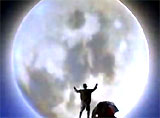
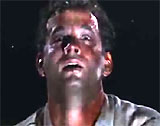
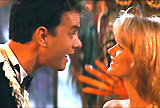
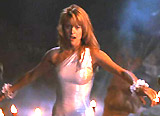
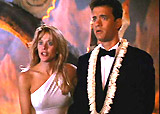
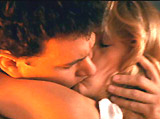
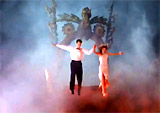
|
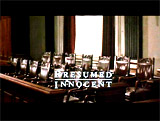
|
Presumed Innocent (1990)
Screenwriter(s): Frank Pierson, Alan J. Pakula
 Opening
and Closing Voice-Overs Opening
and Closing Voice-Overs
Play clip (excerpt): 
The film told about how Kindle County prosecutor,
Rozat "Rusty" Sabich (Harrison Ford), married to
Barbara (Bonnie Bedelia) with one young son, took the case
of the rape-murder of his own female colleague/mistress Carolyn
Polhemus (Greta Scacchi), a conflict of interest, and then
became the prime suspect.
Although the case was ultimately
dismissed, Sabich discovered evidence (a bloody hatchet)
that proved his jealous wife was the killer of Polhemus,
but he could not turn her in ("I couldn't take his mother
from my son"). The case was left unsolved, although
he continued to punish himself -
I am a prosecutor. I am a part of the business
of accusing, judging and punishing. I explore the evidence
of a crime and determine who is charged, who is brought
to this room to be tried before his peers. I present my
evidence to the jury and they deliberate upon it. They must
determine what really happened. If they cannot, we will
not know if the accused deserves to be freed or should
be punished. If they cannot find the truth, what is our
hope of justice?
The murder of Carolyn Polhemus remains unsolved.
It is a practical impossibility to try two people for the
same crime. Even if it wasn't, I couldn't take his mother
from my son. I am a prosecutor. I have spent my life in the
assignment of blame. With all deliberation and intent, I
reached for Carolyn. I cannot pretend it was an accident.
I reached for Carolyn, and set off that insane mix of rage
and lunacy that led one human being to kill another. There
was a crime. There was a victim. And there is punishment.
|


Opening


Closing
|

|
Presumed Innocent (1990)
Screenwriter(s): Frank Pierson, Alan J. Pakula
 A
Scorned Woman's Murder Confession A
Scorned Woman's Murder Confession
Barbara (Bonnie Bedelia), the wife of Assistant
DA Rusty Sabich (Harrison Ford) confessed in a lengthy scene
at their dining room table, about how she murdered Caroline
Polhemus (Greta Scacchi) because of her affair with Rusty:
You understand what happened had to happen.
It couldn't have turned out any other way. A woman's depressed
- with herself, with life. With her husband, who had made
life possible for her, until he was bewitched by another
woman. A destroyer. Abandoned. Like someone left for dead.
She plans her suicide, until the dream begins. In the dream,
the destroyer is destroyed. That's a dream worth living
for. Now, with such simplicity, such clarity, everything
falls into place. It must be a crime that her husband can
declare unsolved and be believed by all the world. She
must make it look like a rape, but she must leave her husband
the clues. Once he discovers who it was, he'll put the
case into the file of unsolved murders. Another break-in
by some sex-crazed man. But all his life, he'll know that
it was her. She remembers a set of glasses she bought for
the woman some time before - a housewarming gift from her
husband and his office. She buys another set. Her husband
has a beer one night - doesn't even comment on the glass.
Now she has his fingerprints. Then on a few mornings, she
saves the fluid that comes out when she removes her diaphragm.
Puts it in a plastic bag. Puts the bag in the basement
freezer, and waits. She calls the woman and asks to see
her. Stops first at the U and logs into the computer. Now
she has her alibi.
She goes to the woman. The woman lets her in.
When her head is turned, she removes the instrument from
her bag and strikes. The destroyer is destroyed. She takes
a cord out that she brought along, and ties her body in ways
her husband described that perverts do. She feels power,
control. A sense that she's guided by a force beyond herself.
She takes a syringe and injects the contents of the Ziploc
bag. Leaves the glass on the bar. Unlocks the door and windows.
And goes home. And life begins again. Until a trial, when
she sees her husband suffer the way she never intended. She
was prepared to tell the truth, right up to the very end.
But magically, the charges were dismissed. The suffering
was over. And they were saved!
Rusty blurted out and sobbed the response: "Saved?!" |

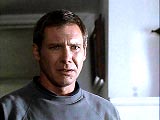
|
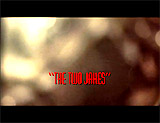
|
The Two Jakes (1990)
Screenwriter(s): Robert Towne
 "You
Can't Forget the Past..." "You
Can't Forget the Past..."
Play clip (excerpt): 
Infidelity/divorce private investigator J.J. "Jake" Gittes
(actor/director Jack Nicholson) mused (in voice-over) about
the past, in a post-war late 40s Los Angeles setting, the sequel
to Chinatown (1974), as he drove
to B&B Homes subdivision in the San Fernando Valley:
Time changes things like the fruit stand
that turns into a filling station. But the footprints and
signs from the past are everywhere. They've been fighting
over this land ever since the first Spanish missionaries
showed the Indians the benefits of religion, horses, and
a few years of forced labor. The Indians had it right all
along. They respected ghosts. You can't forget the past
any more than you can change it.
Hearing Katherine Mulwray's name
started me thinking about old secrets, family, property,
and a guy doin' his partner dirt. Memories are like that
- as unpredictable as nitro, and you never know what's
gonna set one off.
Like the clues that keep you on the
right track are never where you look for 'em. They fall
out of the pocket of somebody else's suit you pick up at
the cleaners. They're in the tune you can't stop humming,
that you never heard in your life. They're at the other
end of the wrong number you dial in the middle of the night.
The signs are in all those old familiar places you only think
you've never been before. But you get used to seeing them
out of the corner of your eye, and you end up tripping
over the ones that are right in front of you. I should have
been wise to Berman's hand-wringing act from the very beginning.
It was as plain as the shoes on his feet.
|


|
